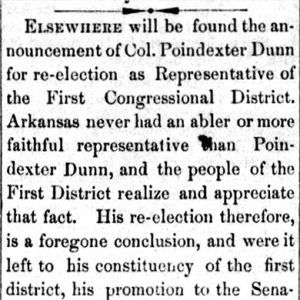calsfoundation@cals.org
Poindexter Dunn (1834–1914)
Poindexter Dunn was a Democratic member of the U.S. House of Representatives. He represented the First District of Arkansas in the Forty-Sixth through the Fiftieth Congresses, serving from 1879 to 1889.
Poindexter Dunn was born on November 3, 1834, near Raleigh, North Carolina, to Grey Dunn and Lydia Baucum Dunn. He and his family moved to Limestone County, Alabama, in 1837. After receiving his early education in local common schools, he graduated from Jackson College in Columbia, Tennessee, in 1854. He studied law for a time before moving to St. Francis County in Arkansas in 1856 and then won election to the Arkansas House of Representatives in 1858. He also grew cotton until 1861, when the Civil War broke out. Dunn joined the Confederate army, achieving the rank of captain by the end of the war, although there is no evidence that he saw combat.
With his agricultural holdings devastated by the conflict, Dunn again turned his attention to the law, completing his studies and earning admission to the state bar in 1867. He practiced law in Forrest City (St. Francis County) for a decade, earning a reputation as an effective courtroom orator. In 1878, with his legal practice solidly established, Dunn returned to the political arena. A loyal Democrat who had served as a Democratic presidential elector in both 1872 and 1876, Dunn won a seat in the U.S. House of Representatives in 1878, facing no opposition in the November general election. He was elected to four more terms, usually with only token opposition.
During his congressional service, Dunn developed a reputation as a strong opponent of the large railroad companies, earning considerable praise for his opposition to their exploitative practices. He was especially protective of the small landowners who were often the victims of the railroads’ indiscriminate claims, often well in excess of what was needed for the advancing lines. In addition, as he gained more seniority in Congress, Dunn became chairman of the Committee on Merchant Marines and Fisheries, heading that panel in the Fiftieth Congress. He also served on the River and Harbor Committee, the Committee on Indian Depredation Claims, and the Committee on Pacific Railroads.
In 1888, Dunn decided not to seek reelection, retiring after having represented the First District for a decade.
Dunn and his family then moved to Los Angeles, California. As a young man, Dunn had married Mary Eleanora (Ella) Patton, with whom he had one daughter, Susan Medora (Dora) Dunn, but Eleanora died soon after. He later married Susan Fussell, with whom he had two daughters, Annie and another whose name is unknown, as she died in infancy in 1888, likely contributing to his decision to not seek reelection that year.
In Los Angeles, Dunn resumed the practice of law. In 1893, he was appointed by Secretary of the Treasury John G. Carlisle to a special commission “on the prevention of frauds on the custom revenue” for the New York City Customs House. His service on the commission was tinged by controversy over an alleged comment about Union army pensioners. In the end, the controversy seemed less about his comment than about the simmering regional tensions that characterized late nineteenth-century America.
In 1895, Dunn moved to Baton Rouge, Louisiana, where he became involved in railroad construction, an interesting step given his earlier opposition to the excesses of the railroads. He soon moved to Texas, where he made a home in Bowie County.
Dunn was living in Texarkana, Texas, when he died on October 12, 1914. He is interred in Rose Hill Cemetery in Texarkana.
For additional information:
“Poindexter Dunn.” Biographical Directory of the United States Congress. http://bioguide.congress.gov/scripts/biodisplay.pl?index=D000552 (accessed October 30, 2025).
“Poindexter Dunn’s Remark.” Arkansas Gazette, June 16, 1893, p. 2.
William H. Pruden III
Ravenscroft School






Comments
No comments on this entry yet.